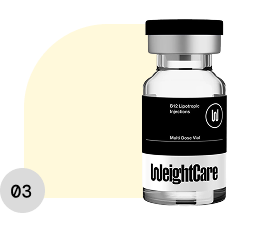Guys, it's time to ditch the crash diets and unrealistic expectations. Let's talk about sustainable weight loss with results, specifically for guys. We're all about feeling energized, conquering challenges with ease, and reducing the risk of chronic diseases. Weight gain happens with age and getting that fat to fall off fast proves to be more of a challenge. Enter Semaglutide this glp-1 agonist that gave me just the boost I needed to feel like I was actually achieving my goals. I struggled for years to actually lose weight, I could always drop a few pounds but never get the transformation I've been longing for. Once I utilized this weight loss solution and the 7 other ways to lose weight into my daily routine. I saw results almost weekly.
Build Muscle and Lose the Body Fat

Strength Training Men naturally have a higher muscle mass compared to women, which has a higher calorie burn when resting. This means strength training is your best friend! Focus on compound lifts that target major muscle groups. Like squats, deadlifts, overhead press, bench press, rows, and pull ups! Adding some high-intensity interval training to your physical activity will leave you feeling more confident and burn fat. All of these exercises focus on building muscle mass and targeting fat mass removal. Don't have access to a gym? No problem! Bodyweight exercises like push-ups, lunges, squats, and planks are excellent for building muscle at home. Diet and exercise are preached in the world of weight loss but its because they work. The key to success in weight management is consistency and if we can apply these exercises three times a week, the research shows that the beer belly will fall right off.
Record Calorie Intake and Try a High-Protein Diet
Prioritize Protein: Protein keeps you feeling fuller for longer and plays a crucial role in muscle repair after workouts. If you are trying semaglutide for the first time you may notice some changes in your eating habits and hunger cues. Aim for 0.8-1 gram of protein per pound of body weight daily. Here are some of the best foods to eat to increase your protein intake if you are aiming for a high-protein diet. Beans, peas, lentils, and fish are all foods with a high protein content and have fewer calories than a burger or a steak. A healthy diet is a main factor that will help with weight loss.
Processed Food = Belly Fat
Ditch the Processed Junk: When you consume sugar, your body releases insulin to regulate blood sugar levels. However, chronically high sugar intake can lead to insulin resistance, making it harder for your body to store energy efficiently and potentially promoting fat storage. In short, focus on unprocessed foods like fruits, vegetables, whole grains, and lean protein sources. These nutrient-dense foods provide sustained energy, keep you feeling satisfied, and curb cravings for sugary or unhealthy snacks. To ensure a balanced and nutritious kitchen, stock up on these protein-rich, lean foods: chicken breasts, fish fillets, lean ground beef, beans, lentils, and tofu. For healthy carbohydrates, consider adding brown rice, quinoa, whole-wheat pasta, sweet potatoes, and whole wheat bread to your pantry. To incorporate beneficial fats into your diet, include foods like avocados, nuts, seeds, and olive oil. I know this seems like an obvious tip but the majority of excess body fat is from sugar.
Lose Weight with Portion Control
Portion Control is King: Just because a food is healthy doesn't mean you can go overboard. Use smaller plates and bowls to help manage portion sizes. Semaglutide is the key secret weapon when it comes to portion control, this medication changes the amount you want to eat and what you crave. After a few weeks you will notice a huge difference with your relationship with food. Pay attention to hunger cues and avoid mindless eating in front of the TV. Here are some strategies for mindful eating. One thing you can do eat slowly and savor your food, literally put your fork down between bites and focus on the taste and texture. Immerse yourself in the food, you may see a side of it you never knew before. Distract yourself from distractions. Turn off the TV and your phone while eating to avoid mindless overconsumption. Spacing off and eating without paying attention can lead to those overeating belly aches. Plan your meals and snacks. Having healthy options readily available reduces the temptation to reach for unhealthy snacks when hunger strikes. The body needs a healthy diet to promote weight loss, managing your calorie intake and writing down the number of calories and how much you are eating really helps with keeping track.
Stress will Cause you to lose muscle and gain fat faster
Manage Stress for Success: Chronic stress can sabotage your weight loss goals. Having a day where it's too hard to do cardio or the want to overeat is uncontrollable. Having these urges isn't wrong or means that you are weak willed- it means you're human. Stress is a natural pain to deal with, but we don't want to lose all that progress because of a bad day. One of the leading causes of obesity is stress. Cortisol, the stress hormone, can lead to increased cravings and increased belly fat storage. Visceral Fat builds at a faster rate when dealing with stress and prevents fat loss from happening. The key to stress management is simple once you learn how to Identify when you are beginning to feel stressed and what is causing the stress. Stress is shady and it sneaks up on us before we realize our hair is falling out. Being able to have a release from that stress is crucial. And no I'm not gonna tell you about yoga or meditation, if that works for you, there is nothing against it, but my ADHD makes sitting still more of a task than a relaxation. For me, it's in the mountains, taking a ride on my dirt bike through some trails and just getting away from the world is where I find peace. For my best friend, his reset comes from his amplifier in the bedroom. He plugs in his Gibson guitar, cranks up the volume, and escapes into the music for a few hours. Finding the place of peace in your life is the pinnacle of stress management.
Water is the way to lose weight
Hydration is Your Hero: Drinking plenty of water throughout the day keeps you feeling full, reduces cravings, and flushes out toxins. Water is an essential lifestyle change that is scientifically proven to promote long-term weight loss. The process of metabolizing fat is called lipolysis, think of this as how your body activates the energy in fat cells. The first step of this process is hydrolysis (key word hydro), which occurs when water molecules interact with triglycerides (fats) to create glycerol and fatty acids basically how our body turns food into fuel. Drinking enough water is essential for burning off fat from food and drink, as well as stored fat. Aim for eight glasses of water daily or 64oz. Adjusting water intake based off of your activity level and climate.
Here are some tips to increase your water intake:
- Carry a reusable water bottle with you throughout the day.
- Set reminders on your phone to drink water at regular intervals.
- Challenge a friend to a competition of who can drink more oz of water in a week.
- Flavor your water with slices of lemon, cucumber, or berries.
- Choose water over sugary drinks like soda or juice.
- Sugary drinks like soda slow the metabolism and leads to weight gain with no added nutritional value.
Sleep away the beer belly
Sleep for Success: When sleep-deprived, your body produces more ghrelin (the hunger hormone) and less leptin (the satiety hormone), leading to increased cravings and decreased energy levels. To help you lose weight prioritize 7-8 hours of quality sleep each night to optimize your weight loss efforts.
Here are some tips for better sleep:
- Establish a Sleeping Routine: create a regular sleep schedule and stick to it, even on weekends.
- Avoid the Blue Lights: Power down phone and TV screens, setting the cell phone down and relaxing will help you get a deeper, better sleep.
- Make it Dark: Darkness promotes the production of melatonin, a hormone that helps regulate sleep. Use blackout curtains, an eye mask, or turn off electronics with bright screens.
- Keep it Cool: The ideal sleep temperature is around 60-67°F (15-19°C). Adjust your thermostat or use lighter bedding accordingly.
- Minimize Noise: Create a quiet sleeping environment. Use earplugs, a white noise machine, or turn off noisy appliances.
- Make it Comfortable: Invest in a comfortable mattress, pillows, and bedding that suit your needs.



